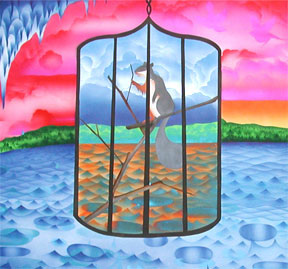
Is it just me, or is this image from a recent New York Times article the oddest picture of two politicians ever? Does it remind the rest of you of the sound stage scene from Singing in the Rain? Are Putin and King Abdullah about to do internationally significant dance of love? Or crawl through a tunnel of Vaseline?
I might be thinking this way because I went to the William Kentridge lecture at the Philadelphia Museum of Art recently. Kentridge showed scenes from two versions of a play, Ubu and the Truth Commission, that was based on a mix of Ubu Roi and testimony from the South African Truth and Reconciliation Commission.

It sounded like a dubious project- Ubu Roi is a funny, depraved, absurdist play, and the Truth and Reconciliation Commission testimony, well, isn't. (Kind of like mixing international politics and Singing in the Rain.) Kentridge showed videos of two versions of the project; there was a theatrical production and a hand-drawn video piece; both versions completely justified the juxtaposition.
Kentridge's Ubu/perpetrator in the theatrical version was terrifyingly human: funny, bestial, compelling, charismatic and absolutely corrupt in a chillingly familiar way. Ubu in the play was a torturer in dirty tightie-whities, sorry for himself, immersed in his appetites and utterly oblivious to the reality of the people he victimized.
Well, maybe not to their reality. They just weren't as real to him as he was.
As we were watching the play, I hoped for an autopsy of the tragedy: to figure out What Went Wrong, like we all do in the face of the past. The comfortable answers I was looking for (something in the water, it's been taken care of) were, of course, not going to be given. The play didn't provide an easy answer, but the answer that it did provide was mind-bendingly universal. The text of the production is rooted in recent South African history, but Kentridge reported that audiences in Switzerland and Australia said it seemed to speak directly to their circumstances. Which is odd.
It might be true that in order to autopsy the crimes of the past we really don't have to look much further back than our own middle school experiences of bullying and being bullied. The people who do these things do it because they're encouraged to, because they can, and because they think the people they're hurting are, not less than human, but less human than they are. It might be that in order to commit atrocities, one needs not to completely dehumanize a person or population, but just to perceive it as less human than oneself. Which isn't so far away from being mean to waitresses.
Kentridge used himself as a model for a set of etchings about Ubu called Ubu Tells the Truth, and he talked about the fact that in the process of determining the truth about apartheid era atrocities, much of the evidence came from pictures and videos the perpetrators of the atrocities themselves had filmed. They turned in evidence that they themselves had kept in order to buy immunity from prosecution. It seems insane that they would have kept such evidence, but they did, and they complained about the petty inconveniences of being torturers. The smell of blood was all over their clothes.

It reminds me, since I work in academia, of the way that academics, including myself, adapt to the privileges of tenure and lose perspective on the real world. I'm all for academia- I think it's a place where, if one is focused and careful, one can buy the right to keep the best parts of one self and the culture alive, but I've also seen tenured professors complain about having to lick their own stamps. Which isn't exactly an atrocity (although it was atrocious), but it's an insensitivity that comes from having little bit of power for too long, so one can only imagine what happens when one has too much for a long time. Kentridge's talk brought home the idea that the people who thrive in conditions of atrocity are part of us. They're normal, and it might be that they're us, gone awry. It's not, I think, that one commits horrors by mistake, but that it takes effort not to fall in line, and that with enough narcissism and enough scope, we're all capable.

No comments:
Post a Comment